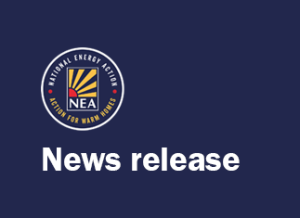Jess Cook – Project Development Manager (Water Poverty) reflects on the significance of the outcomes of the water affordability review
It’s not every day you get the opportunity to shape the landscape of affordability support in water, in fact, it hasn’t been done in over a decade. But in January this year, I was asked to join the CCW project team for their independent review of water affordability support, to help analyse the research and evidence in this area and develop recommendations to make support fairer and more accessible to all. An excellent opportunity for NEA, and not one we were likely to turn down!
Today (26th May) marks the launch of the outcomes of this review, and the first step towards a more consistent approach to supporting customers struggling with their water bills. The review was undertaken with three key workstreams: social tariffs, access and awareness, and wider support. It recognises that there is not a one-size-fits-all approach to affordability support, and that there are still some instances where a local approach may be needed. But overall, it aims to have a more consistent offering for customers who are struggling, and a fairer way of funding and accessing that support.
There are 10 key recommendations, with 40 actions sitting underneath them.
- Customers should be given greater choice and control over how they pay their water bill.
This aims to make the most of technologies available to let customers ‘self-serve’, managing their payments in a way that works best for their individual circumstances. It considers changing the frequency of bills with smart metering and extending payment support services such as Water Direct to support all customers in receipt of benefits, not just those in debt.
- Companies should, wherever possible, take appropriate action, tailored to a customer’s individual needs, with the aim of preventing financial difficulty.
This recognises that prevention is better than the cure, aiming to support customers at the earliest opportunity – before they fall into difficulty – with income maximisation reviews, ability to pay assessments, and water metering bill guarantees.
- Debt support should be based on a customer’s individual circumstances and ability to pay.
A consistent framework to assess ability to pay will ensure all customers are treated fairly, and payment arrangements are suited to their individual circumstances. Reviewing debt guidance to make it clearer and more concise will provide customers falling into debt with a better understanding of the debt journey.
- A range of wider support options should be offered. These should have clear, eligibility criteria and be easily accessible for all customers, with co-design principles being adopted.
This recommendation recognises that social tariffs aren’t right for everyone and aims to introduce new services to support customers during the Universal Credit transition, develop changes to Watersure (including changing the level of the bill cap, and the methods of reconfirmation), and agreeing a set of consistent principles for company crisis funds.
- All available funding streams should be maximised to enable water companies to provide the most effective affordability support for customers.
In all customer research it has been shown that customers are more willing to contribute to affordability support for others if the companies are also doing the same. This calls for companies to fund wider support services, recognising that customers will fund social tariffs through cross-subsidy. It also looks at maximising the impact of innovation funding, and how Ofwat can fairly distribute redress payments through the restorative justice approach.
- Introduce a sustainable, single social tariff to eliminate water poverty in England and Wales at the 5% level. This tariff should have consistent eligibility criteria and be easily accessible to all customers.
There are currently 17 different social tariffs, all with different funding levels, eligibility criteria and support levels. This recommendation calls for a single social tariff, to make it easier for customers and supporting organisations to understand if they are eligible, and to raise awareness of support. Linked directly to a measure of severe water poverty, this will ensure those most in need are supported first. In time, we’d like to see this go even further.
- Customer communications should be clear and accessible.
This recommendation outlines a simple message – make things easy for customers to understand, and let customers access it in a method or format that suits their needs. Additionally, it focuses on developing common branding for affordability support to help raise awareness.
- Water companies should improve their understanding of their customers and the communities they serve, through research, engagement, and increased transparency.
Water companies ‘inherit’ their customers – they’re a regional monopoly, and so do not have a contract with the households they provide their services too. This recommendation recognises that but pushes companies to go further to understand who their customers are, and what their needs are. In addition, it calls for companies to develop a ‘vulnerability commitment’ to treat customers fairly and consistently.
- Water companies should take a proactive approach to identifying those customers who may need support.
This recommendation encourages companies to use the data they already have to identify possible instances of financial difficulty. It encourages companies to look at extremely low levels of water consumption to identify possible instances of self-rationing and offer appropriate interventions.
- Through information and data sharing, companies should increase the information they hold to improve the identification of customers in need of financial support.
Data sharing is key to identifying those in need. This recommendation focuses on maximising the powers of the Digital Economy Act, working with government departments such as DWP to automatically notify of new applications for Universal Credit, and developing data sharing frameworks across multiple sectors to identify those in need at the earliest opportunity.
The review is extensive, and if all recommendations are implemented it will make a significant contribution towards ending water poverty in England and Wales. It’s also encouraging to see a positive initial response by the UK Government to work with industry to build a stronger, better, and fairer water service for those who need it most. We must maintain momentum across the water industry, the regulator and government to fully implement the breath of positive recommendations the Review makes. This is the start of a challenging journey, but one that sits at the heart of the UK Government’s levelling up agenda and if we succeed, we can make water bills affordable for all, and ending water poverty for good. But there will always be opportunities in the review for companies, regulators, and Government to go even further.
In response to the recommendations, we think a Water Poverty Strategy should be developed by Defra and Welsh Government. We also want to see a vulnerability strategy developed by Ofwat and in time, we could potentially extend the social tariff to support customers paying 3% of their disposable income on their water bills. Then there is a huge amount more that can be done to link water efficiency in with affordability.
These are all areas we would love to work with the industry on in the coming months and years. We are all aiming to eradicate water poverty by 2030. If we can retain the current momentum, then this is absolutely achievable. Let’s do what is right for customers struggling with their water bills. Let’s make sure that everyone in the UK has access to safe, clean, and affordable water.
The full report can be accessed here: https://www.ccwater.org.uk/wp-content/uploads/2021/05/Independent-review-of-water-affordability.pdf




